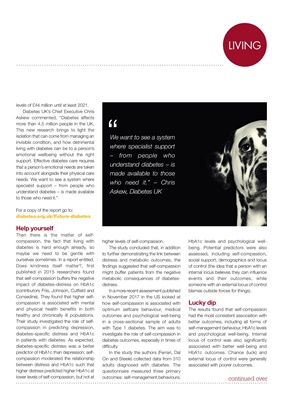
KITLIVING
continued over
levels of £44 million until at least 2021.
Diabetes UK's Chief Executive Chris
Askew commented, "Diabetes affects
more than 4.5 million people in the UK.
This new research brings to light the
isolation that can come from managing an
invisible condition, and how detrimental
living with diabetes can be to a person's
emotional wellbeing without the right
support. Effective diabetes care requires
that a person's emotional needs are taken
into account alongside their physical care
needs. We want to see a system where
specialist support - from people who
understand diabetes - is made available
to those who need it."
For a copy of the report go to:
diabetes.org.uk/Future-diabetes
Help yourself
Then there is the matter of selfcompassion, the
fact that living with
diabetes is hard enough already, so
maybe we need to be gentle with
ourselves sometimes. In a report entitled,
Does kindness itself matter?, first
published in 2015 researchers found
that self-compassion buffers the negative
impact of diabetes-distress on HbA1c
(contributors Friis, Johnson, Cutfield and
Consedine). They found that higher selfcompassion is associated with mental
and physical health benefits in both
healthy and chronically ill populations.
Their study investigated the role of selfcompassion in predicting
depression,
diabetes-specific distress and HbA1c
in patients with diabetes. As expected,
diabetes-specific distress was a better
predictor of HbA1c than depression; selfcompassion moderated the relationship
between distress and HbA1c such that
higher distress predicted higher HbA1c at
lower levels of self-compassion, but not at
higher levels of self-compassion.
The study concluded that, in addition
to further demonstrating the link between
distress and metabolic outcomes, the
findings suggested that self-compassion
might buffer patients from the negative
metabolic consequences of diabetesdistress.
In a more recent assessment published
in November 2017 in the US looked at
how self-compassion is associated with
optimum selfcare behaviour, medical
outcomes and psychological well-being
in a cross-sectional sample of adults
with Type 1 diabetes. The aim was to
investigate the role of self-compassion in
diabetes outcomes, especially in times of
difficulty.
In the study the authors (Ferrari, Dal
Cin and Steele) collected data from 310
adults diagnosed with diabetes. The
questionnaire measured three primary
outcomes: self-management behaviours;
HbA1c levels and psychological wellbeing. Potential predictors
were also
assessed, including self-compassion,
social support, demographics and locus
of control (the idea that a person with an
internal locus believes they can influence
events and their outcomes, while
someone with an external locus of control
blames outside forces for things).
Lucky dip
The results found that self-compassion
had the most consistent association with
better outcomes, including all forms of
self-management behaviour, HbA1c levels
and psychological well-being. Internal
locus of control was also significantly
associated with better well-being and
HbA1c outcomes. Chance (luck) and
external locus of control were generally
associated with poorer outcomes.
We want to see a system
where specialist support
- from people who
understand diabetes - is
made available to those
who need it." - Chris
Askew, Diabetes UK
"